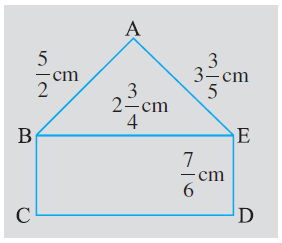NCERT Solutions Class 7 Maths
Chapter – 2 (Fractions and Decimals)
The NCERT Solutions in English Language for Class 7 Mathematics Chapter – 2 Fractions and Decimals Exercise 2.1 has been provided here to help the students in solving the questions from this exercise.
Chapter : 2 Fractions and Decimals
- NCERT Solution Class 7 Maths Exercise – 2.2
- NCERT Solution Class 7 Maths Exercise – 2.3
- NCERT Solution Class 7 Maths Exercise – 2.4
- NCERT Solution Class 7 Maths Exercise – 2.5
- NCERT Solution Class 7 Maths Exercise – 2.6
- NCERT Solution Class 7 Maths Exercise – 2.7
Exercise – 2.1
1. Solve:
(i) 2 –
(ii) 4 +
(iii)
(iv)
(v)
(vi)
(vii)
Solution –
(i) 2 –
=
LCM of 1, 5 = 5
=
=
=
(ii) 4 +
=
LCM of 1, 8 = 8
=
=
= =
(iii)
LCM of 5, 7 = 35
=
=
=
(iv)
LCM of 11, 15 = 165
=
=
=
(v)
LCM of 10, 5 and 2 = 10
=
=
= =
=
(vi)
=
LCM of 3, 2 = 6
=
=
= =
(vii)
=
LCM of 2, 8 = 8
=
=
= =
2. Arrange the following in descending order:
(i) ,
,
(ii) ,
,
Solution –
(i) ,
,
LCM of 9, 3, 21 = 63
=
=
=
=
=
=
Clearly,
>
>
Hence,
>
>
(ii) ,
,
LCM of 5, 7, 10 = 70
=
=
=
=
=
=
Clearly,
>
>
Hence,
>
>
3. In a “magic square”, the sum of the numbers in each row, in each column and along the diagonals is the same. Is this a magic square?
Solution –
Sum along the first row = +
+
=
Sum along the second row = +
+
=
Sum along the third row = +
+
=
Sum along the first column = +
+
=
Sum along the second column = +
+
=
Sum along the third column = +
+
=
Sum along the first diagonal = +
+
=
Sum along the second diagonal = +
+
=
Since the sum of the numbers in each row, in each column, and along the diagonals is the same, it is a magic square.
4. A rectangular sheet of paper is cm long and
cm wide. Find its perimeter.
Solution –
Length of sheet = cm =
cm
Breadth of sheet = cm =
cm
We know that,
Perimeter of the rectangle = 2 × (length + breadth)
= 2 ×
LCM of 2, 3 = 6
= 2 ×
= 2 ×
= 2 ×
= cm =
cm
Hence, the perimeter of the sheet of paper is cm.
5. Find the perimeters of (i) ΔABE (ii) the rectangle BCDE in this figure. Whose perimeter is greater?

Solution –
Given AB = cm, AE =
=
cm, BE =
=
cm, ED =
cm
(i) Perimeter of ∆ABE
Perimeter of the triangle = Sum of all sides
Perimeter of ∆ABE = AB + BE + EA
= +
+
The LCM of 2, 4 and 5 = 20
=
=
= =
cm
(ii) Perimeter of the rectangle BCDE
Perimeter of the rectangle = 2 × (length + breadth)
Perimeter of rectangle BCDE = 2 × (BE + ED)
= 2 × [ +
]
The LCM of 4, 6 = 12
= 2 ×
= 2 ×
= 2 × =
=
Perimeter of triangle ABE =
Perimeter of rectangle BCDE =
LCM of 20 and 6 = 60
=
=
=
=
Clearly, >
Hence, >
∴ Perimeter of ∆ABE > Perimeter of Rectangle BCDE
6. Salil wants to put a picture in a frame. The picture is cm wide. To fit in the frame the picture cannot be more than
cm wide. How much should the picture be trimmed?
Solution –
The width of Picture = =
cm
Required width of a Frame = =
cm
∴ The picture should be trimmed by = –
The LCM of 5, 10 = 10
=
=
= cm
Thus, the picture should be trimmed by cm.
7. Ritu ate part of an apple and the remaining apple was eaten by her brother Somu. How much part of the apple did Somu eat? Who had the larger share? By how much?
Solution –
Part of apple eaten by Ritu is =
Part of apple eaten by Somu is = 1 – Part of apple eaten by Ritu
= 1 –
The LCM of 1, 5 = 5
=
= =
∴ Part of apple eaten by Somu is
So, >
hence, Ritu ate larger size of apple.
Now, the difference between the two shares = –
= =
Thus, Ritu’s share is larger than share of Somu by
8. Michael finished colouring a picture in hour. Vaibhav finished colouring the same picture in
hour. Who worked longer? By what fraction was it longer?
Solution –
Time taken by Michael to colour the picture is = hr.
Time taken by the Vaibhav to colour the picture is = hr.
The LCM of 12, 4 = 12
=
=
=
=
Clearly, <
Hence, <
Thus, Vaibhav worked for longer time.
So, Vaibhav worked longer time by = –
= –
=
=
= hour longer.

Leave a Reply